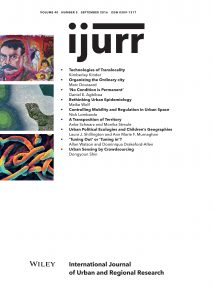The meanings and practices of space shape how cities are understood and governed. This article argues that space is central to understandings of mobility and practices of regulation in the city. Undertaking an analysis of the regulation of Muslim pilgrims (Hajis) in colonial Bombay (Mumbai) from 1880 to 1914, this article explores urban governance discourses around race, religion and public health at a variety of scales. It investigates the way that Hajis were problematized through these discourses, and targeted as threats to elite power and prosperity in the specific context of Bombay as a global shipping and economic hub. I conclude that elite conceptions of the city shape the governance of problematized bodies in ways which reinforce the meanings and politics of mobility and space. Elite understandings of movement and the city itself shape the practices and targets of urban regulation and control.

